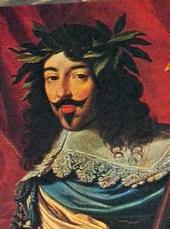Louis XIII of France
Louis XIII (September 27, 1601 – May 14, 1643) ruled as King of France and Navarre from 1610 to 1643.
Henri IV of France - father
Marie de' Medici - mother
Born at the Château de Fontainebleau, Louis XIII was the eldest child of Henry IV of France (1589–1610) and Marie de' Medici. As the eldest son of the king, he was a Fils de France. His father was the first Bourbon King of France, having succeeded his ninth cousin, Henry III of France (1574–89), in application of the Salic law. Louis XIII's paternal grandparents were Antoine de Bourbon, Duke of Vendome and Jeanne d'Albret, Queen of Navarre; his maternal grandparents were Francesco I de' Medici, Grand Duke of Tuscany and Johanna, archduchess of Austria.
birth of Louis XIII
Louis XIII ascended to the throne in 1610, at the age of eight and a half, upon the assassination of his father. His mother acted as Regent until Louis XIII came of age at thirteen, but she clung to power unofficially until in frustration he took the reins of government into his own hands at the age of fifteen. The assassination of Concino Concini (April 24, 1617), who had greatly influenced Marie's policymaking, and Marie's own exile to Blois, removed her from power. Louis then came into his own as ruler of France. He filled his court with loyal friends and sidelined those who remained loyal to his mother. Under Louis XIII's rule, the Bourbon Dynasty sustained itself effectively on the throne that Henry IV had recently secured; but the question of freedom of religion continued to haunt the country.
Concino Concini
Anne of Austria
On November 24, 1615, Louis XIII married Anne of Austria (September 22, 1601 – January 20, 1666). They were childless for almost twenty-three years and almost hopeless when the heir to the throne, the future Louis XIV, was born. Many regarded this birth as a divine miracle and, in show of gratitude to God for the long-awaited birth of an heir to the French throne, his parents named him Louis-Dieudonné (“God-givenâ€). As another sign of gratitude, according to several interpretations, seven months before his birth, France was dedicated by his father, Louis XIII, to the Virgin Mary, who, many believed, had interceded for the perceived miracle. However, the text of the dedication does not mention the royal pregnancy and birth as one of its reasons. Also, Louis XIII himself is said to have expressed his skepticism with regards to the miracle after his son's birth.
Louis XIV of France
Two years later, his second son, Philippe I, was born.
The brilliant and energetic Cardinal Richelieu played a major role in Louis XIII's administration from 1624, decisively shaping the destiny of France for the next 18 years. As a result of Richelieu's work, Louis XIII became one of the first exemplars of an absolute monarch. Under Louis XIII the Hapsburgs were humiliated, the French nobility was firmly kept in line behind their King, and the political and military privileges granted to the Huguenots by his father were retracted (while their religious freedoms were maintained). Furthermore, Louis XIII had the port of Le Havre modernized and built up a powerful navy. Unfortunately time and circumstances never permitted King and Cardinal to attend to the administrative reforms (particularly of France's tax system) which were urgently needed.
Cardinal Richelieu
The King also worked to reverse the trend of promising French artists to leave for Italy to work and study. Louis XIII commissioned the great artists Nicolas Poussin and Philippe de Champaigne to decorate the Louvre. In foreign matters, Louis XIII organized the development and administration of New France, expanding the settlement of New France westward along the Saint Lawrence River from Quebec City to Montreal.
Nicolas Poussin
Philippe de Champaigne
After Louis XIII's death in 1643, his wife Anne acted as regent for their four-year-old son, Louis XIV of France (1638–1715).
death of Louis XIII
Try the BEST MySpace Editor and MySpace Backgrounds at MySpace Toolbox !
